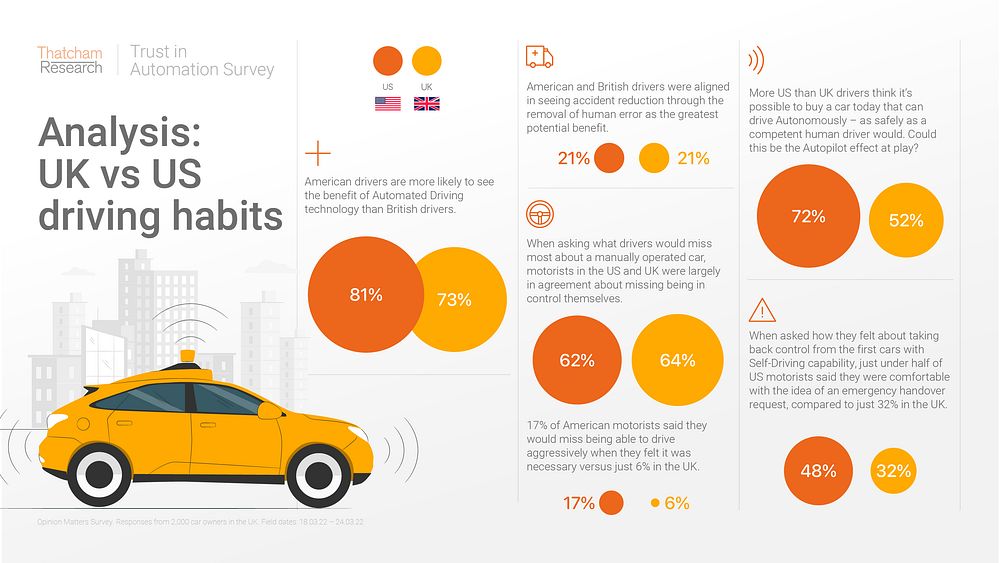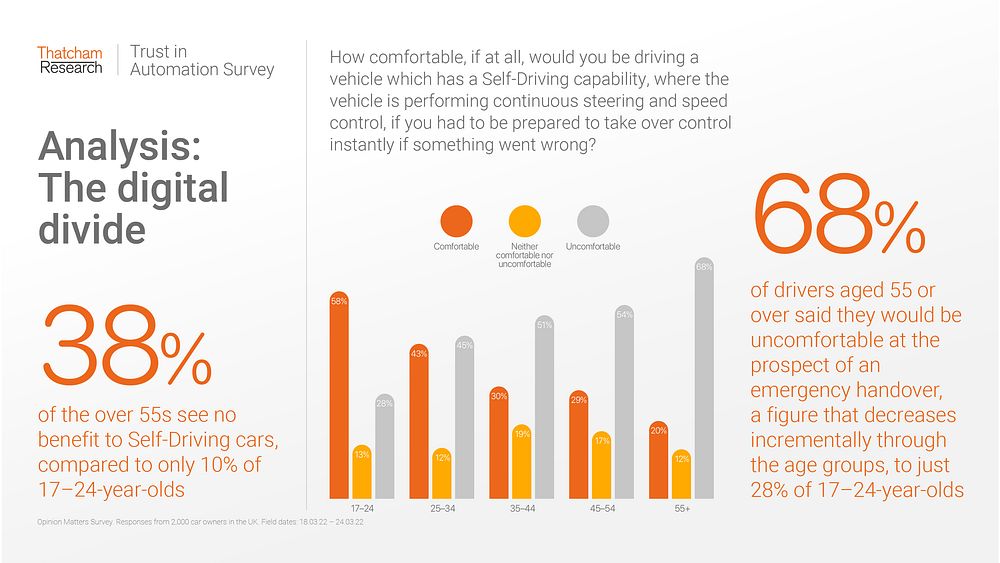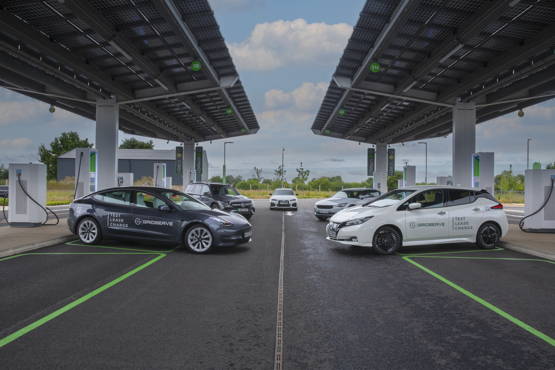
Thatcham Analysis is as we speak revealing additional insights from its Belief in Automation [1]research – which polled 2,000 motorists within the US and a couple of,000 within the UK – and located a big disconnect between attitudes and behaviours on both aspect of the Atlantic.
American drivers usually tend to a see a profit to self-driving or autonomous know-how than British drivers: 81% versus 73% respectively. Nonetheless, American and British drivers had been aligned in seeing accident discount by the elimination of human error (21%) as the best potential profit.
It follows due to this fact that American drivers are extra enthusiastic for the approaching introduction of vehicles with restricted self-driving know-how like Automated Lane Protecting Techniques (ALKS); 11% said they’d purchase a automobile with self-driving functionality as quickly as doable versus simply 4% within the UK.
Asking drivers what they’d miss most about driving a operated by hand automobile additionally uncovered some fascinating contrasts in driving behaviours. Though the drivers surveyed had been largely in settlement about lacking being in management themselves (US 62% and UK 64%), 17% of American motorists mentioned they’d miss having the ability to drive aggressively after they felt it was vital versus simply 6% within the UK, whereas 19% within the US mentioned they’d miss bending the foundations of the highway in contrast with solely 9% within the UK.
Matthew Avery, chief strategic analysis officer, Thatcham Analysis feedback: “That is an intriguing problem for system builders. We all know that manufacturers are designing Automated programs to comply with native human driving patterns, making the automobile’s driving model kind of assertive as related.”
Though US drivers look like extra open to Automation, they’re additionally much more prone to be satisfied that present know-how can present a totally autonomous driving expertise. 72% within the US versus 52% within the UK suppose that it’s doable to purchase a automobile as we speak that may drive utterly autonomously, as safely as a reliable human driver would.
Avery feedback: “May this be the Autopilot impact at play? The claims made by huge manufacturers providing ‘full self-driving’ packages have clearly been taken on board by American drivers.”
When requested how they felt about taking again management from the primary vehicles with self-driving functionality like ALKS, just below half (48%) of American motorists mentioned they had been snug with the concept of an emergency handover request from the system. Within the UK this quantity drops to 32%.
Digital divide: taking again management spooking older drivers
The Belief in Automation research has additionally recognized a ‘digital divide’ showing between youthful and older UK drivers.
68% of UK drivers aged 55 or over mentioned they’d be uncomfortable on the prospect of resuming management from the system, a determine that decreases incrementally by the age teams, to only 28% of 17–24-year-olds.

Older age teams had been additionally discovered to be probably the most sceptical of Automation basically, with 38% of the over 55s seeing no profit to self-driving vehicles, in comparison with solely 10% of 17–24-year-olds.
Avery feedback, “Regardless of the discomfort expressed by drivers, they should be ready to renew management from the system. As such it’s elementary that self-driving programs talk clearly with drivers and that these drivers are wholly conscious of their duties.
“With out that readability of communication – from naming conventions to how the system informs motorists that the self-driving mode is engaged – the business may miss an enormous alternative to begin our journey in direction of Automation on the most secure doable foundations.
“Providing reassurance to extra skilled drivers is essential, for the reason that first automobiles with self-driving functionality usually tend to be out of the monetary attain of youthful age teams.”
[1] The analysis was carried out by Opinion Issues, amongst a pattern of 4,000 automobile homeowners (2,000 respondents in UK and a couple of,000 respondents in USA) aged 17+. The information was collected between 18.03.22 – 24.03.22. Opinion Issues abides by and employs members of the Market Analysis Society and follows the MRS code of conduct which is predicated on the ESOMAR rules.
SOURCE: Thatcham Research






